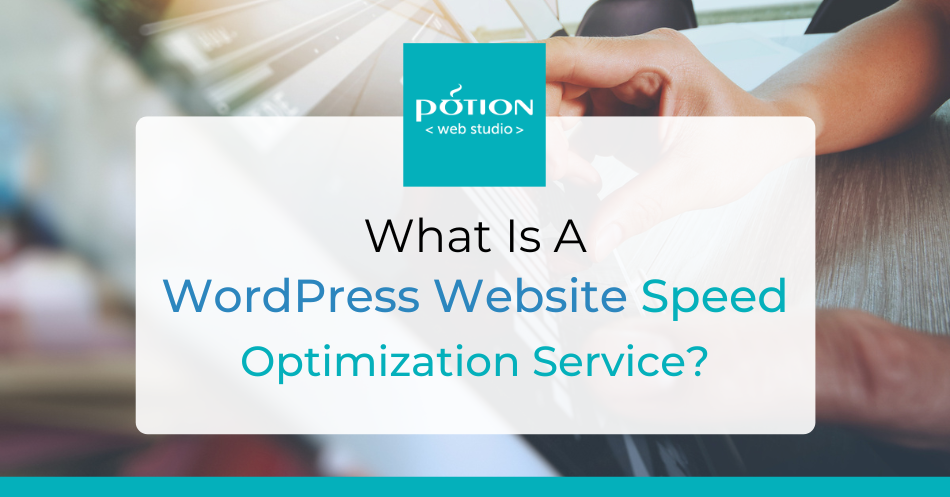Slow WordPress website? Yawn. Nobody likes load speeds that keep them waiting.
If your website needs speeding up, you’ll want a WordPress website speed optimization service – but what exactly is it?
Don’t worry, we can explain…
Imagine your WordPress website’s like a library. An untidy library, where all the books – full of text, images and other media – are scattered all over the place. It’ll take a lot of time to sort through that mess to find the book you’re looking for, right? Any visitor to the library’s going to have to wait.
(And that means they’ll probably head off to your competitor’s library down the road, instead. Bad news for your business.)
Luckily, there’s a solution: a WordPress website speed optimization service. It’s like a team of pro librarians coming in to sort everything out. They organise the books (your WordPress website’s many elements) so users can find what they’re looking for much faster.
But just how do they take the website chaos and make your site faster? WordPress website speed optimization can take several forms, including compressing large images, ‘minifying’ code, or using a Content Delivery Network (CDN) to allow more users to access the site’s elements at once.
We’ll get into the detail in a moment, but first…
What happens when your WordPress website isn’t optimized?
If your WordPress website isn’t speed-optimized, you’re looking at a whole bunch of downsides:
- Slow loading time – people are impatient, so they won’t wait for your site to load. They’ll find a faster competitor, and your bounce rate will go up.
- Poor SEO – watch your rankings take a dip as Google penalises slow-loading websites.
- Negative brand perception – people think badly of your business when your website’s not up to speed.
- Lower conversion rates and revenue loss – giving your visitors such bad UX means your conversion rates will fall.

What does a WordPress website optimization service include?
There are TONS of elements involved in optimizing a WordPress website. A good WordPress website speed-up service will look at every aspect to see how your site speed and UX can be improved.
Want to do it yourself? That’s cool, too – even if you only make improvements in some areas, your WordPress website will be faster.
Let’s look at the steps to speed up your website:
1. Reliable web hosting
WordPress can run fastest when you have a high-quality, reliable hosting source. Check out what the provider is offering, including:
- Speed – fast servers decrease your load time.
- Uptime – how much of the time your hosting servers are up and running (we recommend looking for hosting that offers 99.9% uptime).
- Security – free SSL certificates, firewalls, and DDoS protection are important to keep your site safe from hackers.
- Flexibility – so your WordPress website isn’t stuck with a small bandwidth if your needs grow.
- Support – look for hosting providers that offer good customer support.
- Backups – check whether your hosting package will back up your WordPress website regularly.
2. Use a lightweight WordPress theme
Choose your WordPress theme carefully – a lightweight theme will eliminate bloated code and speed up your site.
3. Reducing plugins
Unnecessary plugins will slow your site down. So remove any unused plugins, only use ones that add functionality, and keep them updated for a speeded-up WordPress site.
4. Optimize images
Since large files like images will take longer to load, speed up your WordPress website by compressing them.
You can do this yourself – use image editing software like Photoshop to get you more control over quality. Or check out the WordPress plugins that’ll take care of the job for you.
5. Minify CSS, JavaScript, and HTML
Removing unnecessary characters from your site’s code – known as ‘minifying’ – will reduce its size and give your WordPress site faster loading times.
There are handy plugins to help you minify your WordPress website, like WP Super Minify, Autoptimize or Fast Velocity Minify, or you can get a WordPress web developer to take a look.
6. Use a Content Delivery Network (CDN)
With a CDN, files are hosted across a network of global servers. So when a user wants to view your site, content is delivered from the server closest to them. Shaving off vital fractions of a second is a great way to optimize your WordPress site’s speed.
7. Enable Gzip compression
Gzip compression reduces the size of website files before they’re transferred to your visitor’s browser. It’s a really handy part of your website speed-up toolkit because it dramatically decreases the time it takes for your user’s browser to download your website.
8. Implement caching
Caching involves storing copies of files in a temporary storage location on your user’s device. It means the files can be accessed more quickly the next time they visit – effectively making your WordPress website speed up. Various caching plugins are available for WordPress, so it’s worth doing your research.
9. Optimize your WordPress database
Did you know, everything on your website is stored in a database? The more revisions you make, the more cluttered your database can become.
Having to sift through loads of outdated info before loading will make your website run slower, so sort the wheat from the chaff and clean up your database to speed up your WordPress website.
10. Disable Pingbacks and Trackbacks
Pingbacks and trackbacks are what tell other blogs when you’ve linked to them. On a WordPress website, they’re enabled by default, but these can put unnecessary strain on your server’s resources. Consider whether switching them off might be worthwhile to improve your site speed.
11. Use the latest PHP version
PHP is the server-side scripting language that powers WordPress. Your user’s browser has to translate info to and from HTML so the website can be displayed on their device.
Like most other types of code, PHP is always evolving, so several versions are supported at any one time. But as with any tech, using an older or outdated version will be significantly slower. Make sure your site’s using the latest version of PHP to make big gains on your WordPress website speed.

Find the best WordPress speed optimization service for you
If you’re fairly experienced, it’s likely you’ll be able to tackle some – or all – of these steps to speed up your WordPress website yourself. But if you’re not a techie, it can be a challenge.
And don’t forget, speeding up your WordPress website isn’t a done-once activity – you’ll need to review your site regularly to make sure everything’s up to date and running as fast as possible.
You might want to outsource your speed optimization to an expert who can take it off your hands. If so, you’re in luck, there are lots of WordPress speed-up service providers to choose from. They’ll be able to make changes that speed up your WordPress website.
However, it’s worth knowing that some WordPress optimization services offer regular updates to keep up your website speed, whereas others are one-off services that you’ll then need to maintain yourself.
Do your research to pick the right WordPress speed optimization service for your website, and if you’re not sure what needs optimizing, get in touch with us at Potion Web Studio. We start our optimization service with a full audit of your WordPress site, so you know that the measures we take for you will make a real difference to your site speed.
Get in touch with us to find out how much faster your WordPress website could become.

